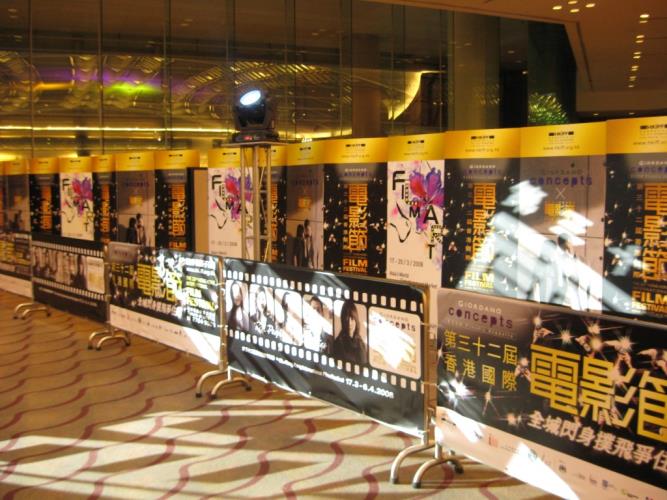Supervisor of Audio-Visual CUT Association. One of the directors of Macau Stories 1, also involved in Macau Stories 2─Love in the City and Macau Stories 3─City Maze. Macau Stories 2─Love in the City received a special mention at Portugal’s Avanca Film Festival, and was shown at film festivals in Tokyo and Osaka.

In recent years, one of the most exciting events for filmmakers in Macao has to be the Gold Aries Award Macau International Film Festival organised by the Macao International Film and Multicultural Development Promotion Association, and jointly organised by Beijing Film Academy. This prestigious festival boasts James Cameron, the director for Avatar, as its honorary chairman, while its evaluation committee chairperson is China’s leading actor Ge You. Kim Dong Ho, the former chairperson for Busan International Film Festival, is also a committee member. Surely, the people in Macao must be proud of the fact that the city is capable of organising such a prestigious film award event. At the same time, however, it is also a good moment to reflect on the potential possibilities that are yet to be captured and leveraged upon from such an important event, particularly for the benefit of Macao’s own film industry. After all, what kind of film festivals or film events are most suitable for the city?
Broadly speaking, there are two types of film festivals: one typically involving film screenings instead of prizes, such as the Hong Kong International Film Festival. Another type is to feature film awards as well as screenings, such as the Cannes Film Festival. Those mainly aimed at prize presentations are often not called film festivals as such. Instead, they are known for the awards, such as the Academy Awards, the Golden Globe Awards, the Golden Horse Awards, and the Hong Kong Film Awards, etc. Nowadays, these three key international film festivals are most recognised by the International Federation of Film Producers Association: the Venice International Film Festival in Italy, the Cannes Film Festival in France, and the Berlin Film Festival in Germany. To date, these three film festivals are the biggest film events worldwide, and certainly their awards are the most recognised. While the Academy Awards are also significant on an international level, they are set up primarily to encourage and affirm the contribution of American film practitioners, and were initially called the Academy Award of Merit, presented by the American Academy of Motion Pictures Arts and Sciences. Since these awards are to encourage the industry professionals, they involve fine categories such as the Best Picture, Best Director, Best Actor and Actress, etc., while the script awards are even sub-divided into the Best Original Screenplay and the Best Adapted Screenplay. Besides, there are also awards on the Best Costume Design and Best Make-up, making a total of 24 awards altogether. Since the aim of the Academy Awards is to affirm the work of different talents in the various processes of the film industry, the focus is on trade professionals, hence it is very different from other film festivals. For example, the Venice International Film Festival does not offer such a fine breakdown of awards, nor do the Cannes and the Berlin Film Festivals. These three major film festivals focus on the essence of film. Among these three events, the Berlin Film Festival is known for its controversial awards. For example, given the global concern towards the issue of Syrian refugees, films on the lives of refugees have also won this year’s Berlin Film Festival awards.
In this context, what category of film festivals does the Gold Aries Awards belong to? Based on the official schedule, the event kicks off with an opening ceremony and city tour by film professionals, while the second day features a film enterprise and tourism culture discussion forum, and a media session, to be followed by a red-carpet-style ceremony and the prize presentation on the third day. There are no film screenings, and so it can be derived that this is an awards-based event. Judging from the graphic design strategies of the festival, there is an emphasis on glamour, while its sales and advertising have successfully attracted the support of many film celebrities and considerable media attention. More importantly, it has the support of the gaming enterprises. No doubt, staging its opening ceremony in a newly-opened, luxurious casino venue is an attractive advertising draw for the gaming enterprise. Seen in this light, the Gold Aries Awards have successfully secured the partnerships from film celebrities, the media, hospitality groups and gaming enterprises, and has shown itself as an exemplary event that leverages on the idea of film to promote Macao as a tourist attraction. This seems to complement Macao’s self-positioning as an “international tourist leisure centre”.
Sadly, no local filmmakers have won the Gold Aries Awards. Nevertheless, this is not the major focus here. The fact that there are local filmmakers passionate about films, that the Macao government is keen to promote film development, and that local film critics have played their part in encouraging new work, is already worth celebrating. One must hope that, with these positive factors in place, it will not be long before Macao enjoys its own film festival or award event of scale, one that is as grand as the Gold Aries Award while at the same time affirms the work of local film talents.